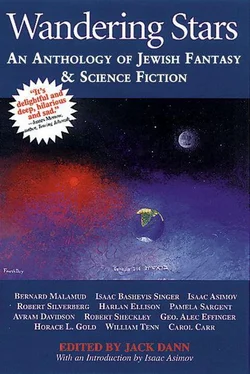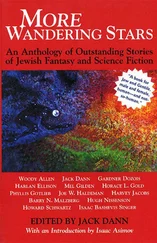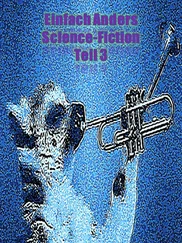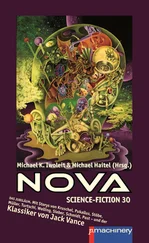Of course, between us, they knew they had to come in with a something. The Congress was at a standstill, the delegates didn’t know how many delegates there were, and they were arguing the matter out every day along with the Court. There were fights over the Bulbas, there were factions over the Bulbas, and a lot of people had gone home already saying they were sick and tired of the Bulbas.
So.
The decision reviewed all the evidence, all the commentaries, all the history, from Ezra and Nehemia on. It showed what was to be said for the conservative group in the Court, the group which began and ended with the traditional proposition that a Jew is someone who is provably the child of a Jewish mother. Then it went into what was to be said for the liberal-radical wing, the people who felt that a Jew is anyone who freely accepts the ol , the yoke, the burden, of Jewishness. And then the decision discussed a couple of positions in-between, and it pointed out that there was no way to sew them all together.
But do they have to be sewn together? Is there any chance that a human being and a Bulba will mate? And what happens if we go deeper and deeper into space, to another galaxy even, and we find all kinds of strange creatures who want to become Jews? Suppose we find a thinking entity whose body is nothing but waves of energy, do we say, no, you’re entirely unacceptable? Do we know for sure that it is?
Look at it another way. Among human beings there are Jews and there are goyim , gentiles. Between Jews there are a lot of different types, Reformed, blue, Levittown, Williamsburg, and they don’t get along with each other so good, but measure them against goyim and they’re all Jews. Between Jew and goy there are a lot of differences, but measure them against any alien and they’re both human beings. The word goy does not apply to aliens. Up to recently.
We’ve all seen, in the last century or two, how some creatures from the star Vega have adopted an Earth-type religion, two different Earth-type religions, in fact. They won’t let Jews into the land of Israel, they maneuver against us, they persecute us. Are these ordinary aliens, then? Certainly not! They may look nonhuman, like crazy giant oysters, but they definitely have to be put into the category of goyische aliens. Aliens may be aliens, but the Vegans are quite different as far as Jews are concerned: the Vegans are alien goyim.
Well, if there are alien goyim , why can’t there be alien Jews? We don’t expect human goyim to marry alien goyim , and we don’t expect human Jews to marry alien Jews. But we can certainly face the fact that there are aliens who live as we do, who face problems as we do, and—if you won’t mind—who worship as we do. There are aliens who know what a pogrom tastes like, and who also know the sweetness of our Sabbath. Let’s put it this way: there are Jews—and there are Jews. The Bulbas belong in the second group.
These are not the exact words of the decision, you understand. It’s a kind of free translation, provided for you with no extra charge by Milchik the TV man. But it gives you enough to gnaw on.
Not everyone went along with the decision. Some of the Bulbas complained. And a whole bunch of Williamsburgniks walked out of the Congress saying, Well, what could you expect? But the majority of the delegates were so happy to have the thing settled at last that they voted to let the decision stand and to accept the Bulbas. So the Bulbas were also happy: they were full Jewish delegates.
The only trouble was, just as they were finally getting down to the business of the Congress, an order came down from the Viceroy of Venus abolishing it. He said the Congress had gone on too long and it was stirring up bad feelings. All the delegates were sent packing.
Some excitement for a planet like this, no? Rabbi Smallman is still our rabbi, even though he’s famous now. He’s always going away on lecture tours, from one end of the galaxy to the other. But he always comes back to us, every year, for the High Holy Days. Well, not exactly, you know how it is, once in a while he can’t make it. A celebrity, after all. The Great Rabbi of Venus. He’s in demand.
And so’s my Aaron David, in a way. He finally made it to a yeshiva. The Bulbas are paying for it, they sent him to one on the other side of Venus, in the Yoruba Burrow. Once in a while I get a letter from him. What he plans to do, it’s the agreement he has with them, he’s going to go to Rigel IV and be their rabbi.
But of a possible bride he says nothing. Listen, maybe I’ll turn out to be the grandfather of a lumpy brown pillow with short gray tentacles? A grandchild, I guess, is still a grandchild.
I don’t know. Let’s talk about something cheerful. How many people would you say were killed in that earthquake on Callisto?
The Golem is the Jew’s Frankenstein. (Indeed, the Golem legends might have prompted the idea for Mary Shelley’s Frankenstein .) Legend has it that the Golem was created out of clay by Rabbi Löw of Prague for the protection of persecuted Jews. Its dreadful corpse is said to be still lying in the attic of a synagogue, ready to be raised again if needed. The Golem is one of the most powerful symbols to come out of Jewish lore. It is a symbol of fear and dread, but also of love and pride, for it was created with God’s consent. The Golem is a clay mannikin, an automaton infused with life to become man’s servant and, hopefully, an instrument of God’s will. Upon its forehead is written the sacred word Shem , the life-principle. If this word is rubbed out, the Golem will sink into a lump of clay. Thus man retains ultimate power over his clay servant. But each day the Golem increases in strength and size. One day the owner might find that he cannot reach its forehead to erase the sacred word. So the Golem becomes a threat, even when it is dutifully performing good deeds. In the end, the Golem goes mad. The creation of an artificial being becomes a tragedy.
Avram Davidson has blended the legend into a warm, poignant, sometimes comic story set in a modern land of Jewish make-believe, that warm country called California where everything is stable and quiet and filled with hours of sweet-sad reminiscence. There, white-haired couples who have always been in love can hold hands and count nephews and speak Yiddish. A place of simple expectations and, of course, no surprises. Sometimes.
—J. D.
*
THE GRAY-FACED PERSON CAME ALONG THE STREET where old Mr. and Mrs. Gumbeiner lived. It was afternoon, it was autumn, the sun was warm and soothing to their ancient bones. Anyone who attended the movies in the twenties or the early thirties has seen that street a thousand times. Past these bungalows with their half-double roofs Edmund Lowe walked arm-in-arm with Leatrice Joy, and Harold Lloyd was chased by Chinamen waving hatchets. Under these squamous palm trees Laurel kicked Hardy and Woolsey beat Wheeler upon the head with codfish. Across these pocket-handkerchief-sized lawns the juveniles of the Our Gang Comedies pursued one another and were pursued by angry fat men in golf knickers. On this same street—or perhaps on some other one of five hundred streets exactly like it.
Mrs. Gumbeiner indicated the gray-faced person to her husband.
“You think maybe he’s got something the matter?” she asked. “He walks kind of funny, to me.”
“Walks like a golem,” Mr. Gumbeiner said indifferently.
The old woman was nettled.
“Oh, I don’t know,” she said. “I think he walks like your cousin Mendel.”
The old man pursed his mouth angrily and chewed on his pipe stem. The gray-faced person turned up the concrete path, walked up the steps to the porch, sat down in a chair. Old Mr. Gumbeiner ignored him. His wife stared at the stranger.
Читать дальше












